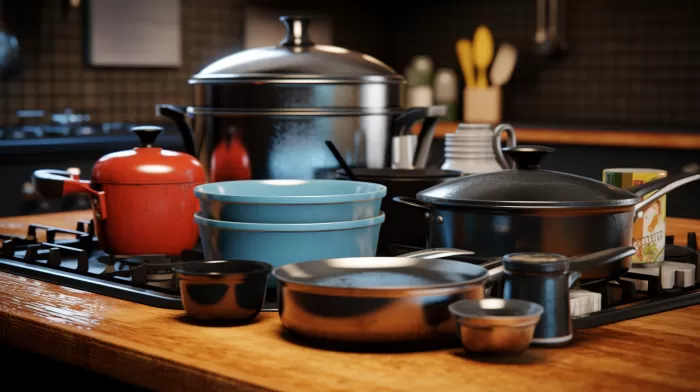A healthy diet is essential for optimal wellness, but using the wrong cookware could be contaminating your food with health-damaging toxins. Over the past decade, consumer reports have highlighted the presence of harmful chemicals and heavy metals in aluminum and nonstick cookware. As a result, companies manufacturing nonstick cookware have been battling the Environmental Protection Agency for several years.
The Dangers of PFOAs
PFOAs (perfluorooctanoic acid) is the main chemical used in the manufacture of nonstick coating surfaces and materials that are fire-resistant and able to repel oil, stain, grease, and water. While this feature might make PFOA appear to be the ideal item for nonstick cookware and food packaging, scientists have expressed grave concerns about how exposure to this toxin, as well as the 15 other types of potential gases that can be released when cooking with nonstick cookware, may affect your health.
Several studies show that PFOA and related compounds have been found in tap water, food, or air in a number of cities across the country, indicating a highly prevalent risk of exposure. Other studies link PFOAs in the bloodstream with chronic health problems, such as obesity and immune suppression. Contact with PFOA may come from consumer products, but it frequently also stems from environmental contamination.
Aluminum Can Leach Into Food
Although“normal” intake of aluminum is about 3 to 5 milligrams per day, Americans may ingest up to 10 milligrams per day on average. Cooking and storing acidic foods in aluminum pots and pans can cause higher amounts of aluminum to leach into food. Research suggests that using nonstick, aluminum, and other chemical cookware products can increase risks of cancer, respiratory problems, and other serious health problems in adults and children.
The potential link between aluminum and Alzheimer’s disease was first presented in the 1960s, and since then, further evidence points to aluminum being potentially associated with plaques and tangles in the brains of people with Alzheimer’s disease. Aluminum may also be involved in the initiation of plaque formation.
These and other problematic findings related to aluminum exposure are good reasons to look for alternative cookware.
Protect Your Health: Detoxify Your Kitchen and Your Body
What can you do to protect your body from these harmful and pervasive toxins? The first step is to choose alternatives to replace your aluminum or nonstick cookware. The Seattle-based Toxic-Free Legacy Coalition and other experts recommend cast-iron, glass, and enameled cast-iron cookware as the best options. Many people also ask about stainless steel, but some published studies have suggested that even stainless steel alloy cookware can leach nickel and other heavy metals into food.
Once you’ve upgraded your cookware, it is equally important to choose an effective method of clearing your body of toxic buildup. A top recommendation is to engage in a gentle and gradual heavy metal and environmental toxin cleanse, using a natural chelation formula made of modified citrus pectin and seaweed-derived alginates.
Not only is this combination of substances clinically proven to remove heavy metals and toxins from the body, but it also achieves this goal without leaching essential minerals in the process. Additionally, it aids in preventing the reabsorption of toxins through the digestive tract. When used over three to six months, this natural chelation formula offers clinically proven, gentle detoxification from health-robbing heavy metals and environmental toxins that may have been stored in our tissues and organs for years.



